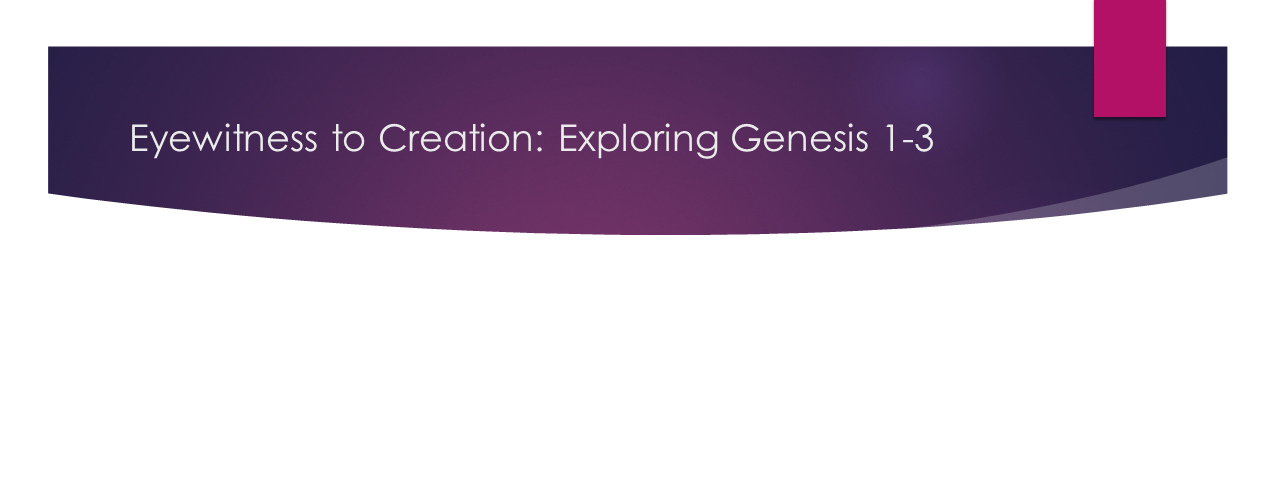Session 6: Chaos Returns
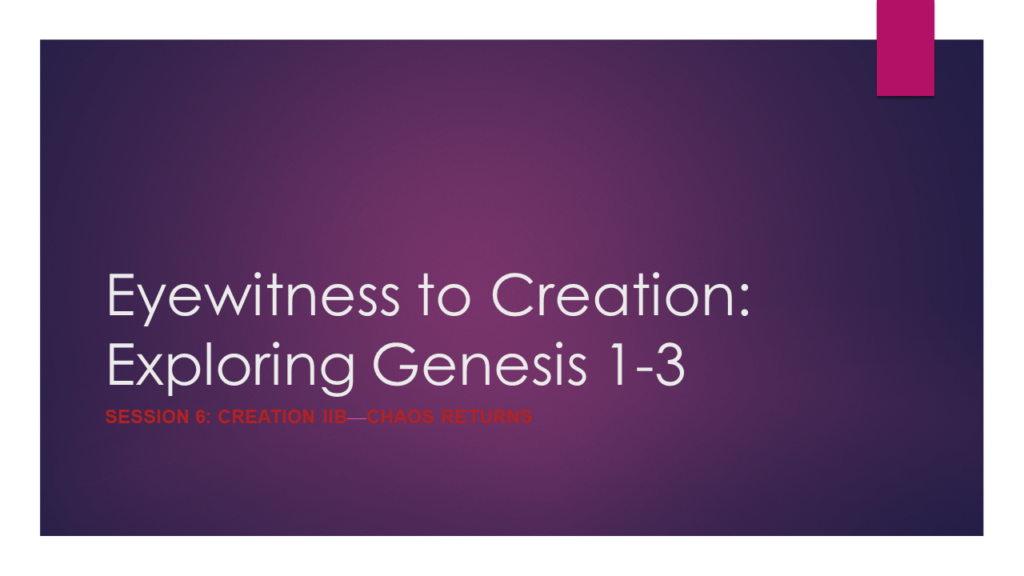
We’ll start with one final brief review of where we’ve been over the past five weeks. Then, we’ll be finishing up our work on the first three chapters of the Book of Genesis.
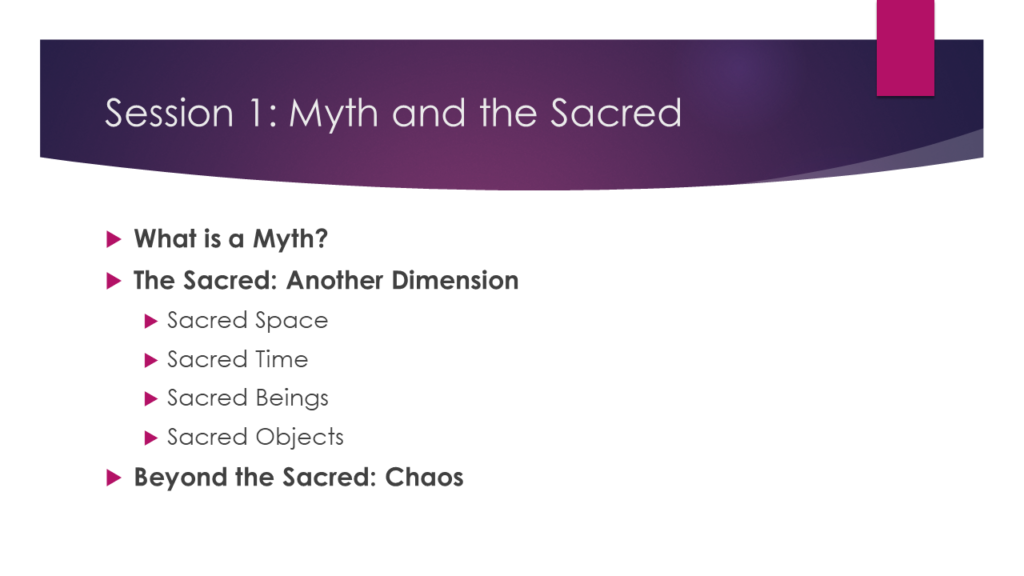
Today, we’ll complete our journey outside the limitations of physical space and time. For a little while longer, we remain in the realm of sacred space where there is neither location nor dimensions and sacred time where there is neither duration nor past nor future, only present.
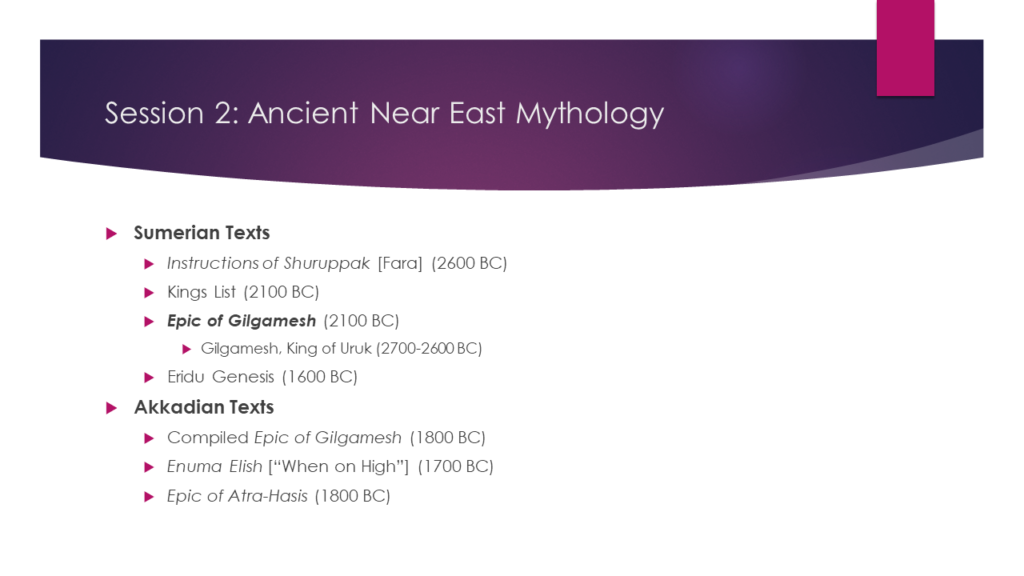
Many times, already, we’ve referred to the creation myths of the ancient near east. In the first creation story from Genesis, we referred to passages from the Enuma Elish that were borrowed to describe how everything came to be. Today, we’ll see a brief passage from the Epic of Gilgamesh that relates to the Yahwist’s version of the story.
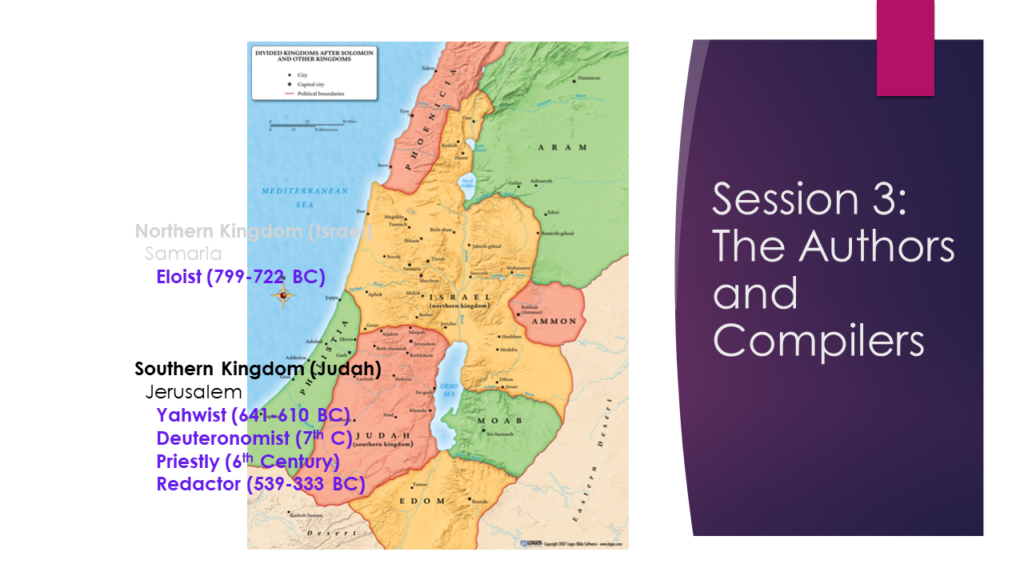
We recall that the first creation story came from the Priestly tradition in the sixth century BC after the return to Jerusalem from exile in Babylon. The Yahwist author who wrote the second creation story, lived about a century earlier.
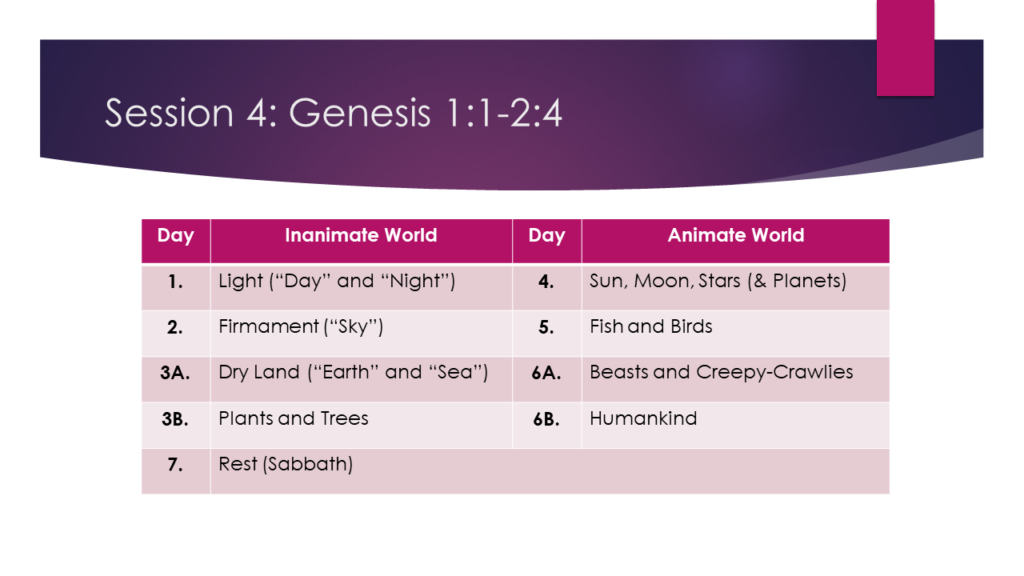
We saw that the Priestly author was structured and scientific in his approach to the text, stripping out all references to other gods and refraining from naming and anthropomorphizing the God of Israel.
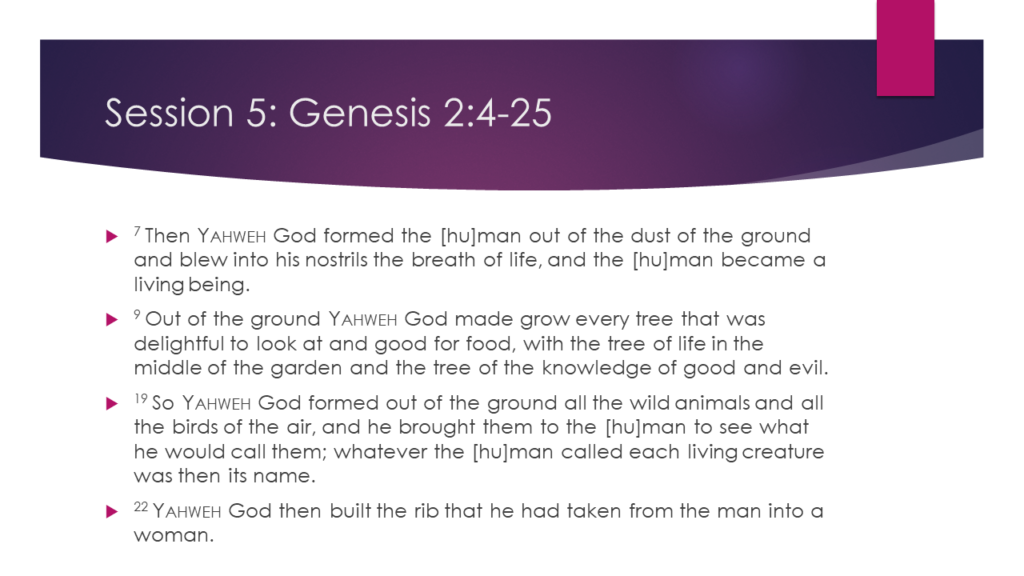
We noticed that the Yahwist used God’s proper name in his writings, and his portrayal of God was far more anthropomorphized, having God create mankind and animals like a potter out of clay and planting the plants and trees himself. He cares about the human’s social needs and gives him animals for company and a partner who is his equal. He also talks to him, warning him about the tree of the knowledge of good and evil.
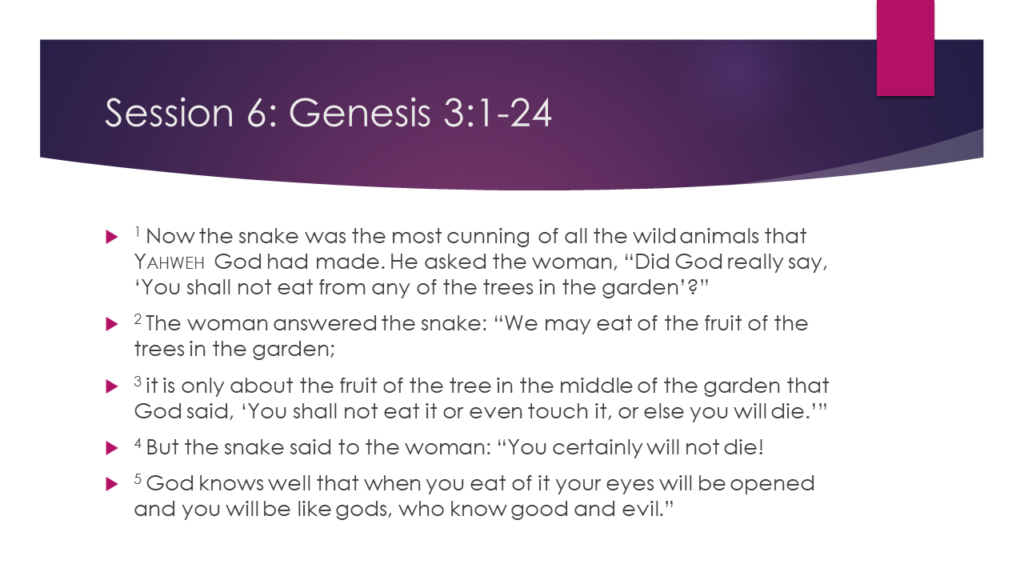
The snake (or serpent) was not a god or special creation, it’s just another animal…although a cunning one.
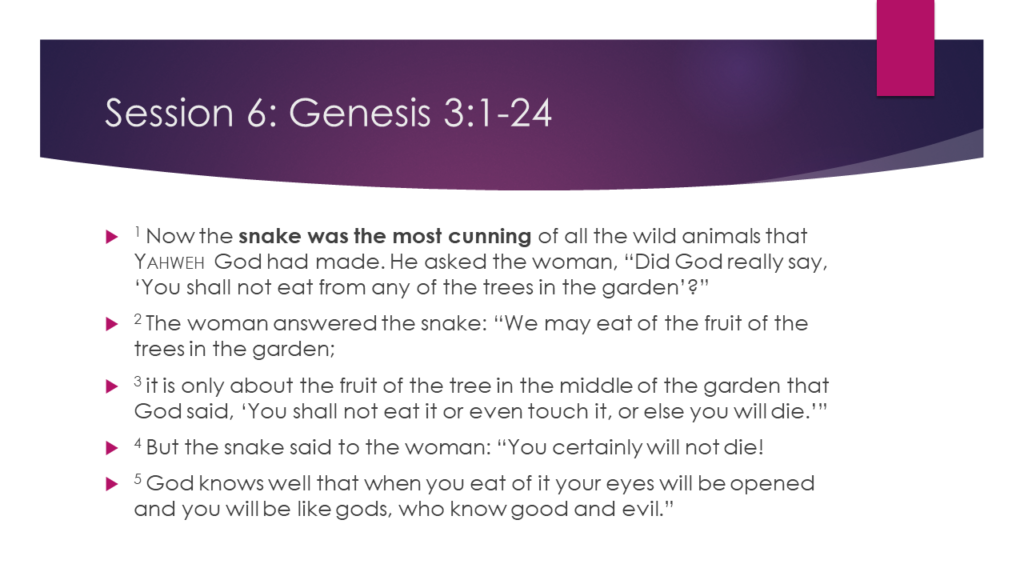
We mentioned last time that the word for “cunning” עָרַם (‘aram) is written the same as the word for “naked” עֵרֹם (‘arom). This is evidently not inadvertent. The cunning of the serpent will be the occasion of the undoing of the innocence of their nakedness.
Why is the tempter a serpent? If we were to take a survey of all the earliest belief systems in human history and looked at all the divinities that have been worshipped, especially once a society has reached the stage of herder and farmer, gods of fertility take center stage. Not only do fertility cults try to assure the continuation of the tribe itself, but they also aim at assuring a stable food supply. Sexual fertility of crops, herds and humans is paramount. Ancient science believed that the male planted the seed in the fertile ground of the female. Therefore, the penis was worshipped as the symbol of fertility and the snake was most often substituted as a symbol for the penis and venerated as a god of fertility. For all its ancient history, Israel’s religious authorities fought against pagan fertility cults. The tempter here, is a thinly-veiled reference to those fertility cults and the temptation that the herders and farmers of Israel had to hedge their bets: worship Yahweh, but it can’t hurt to give a nod to the snake, just in case.
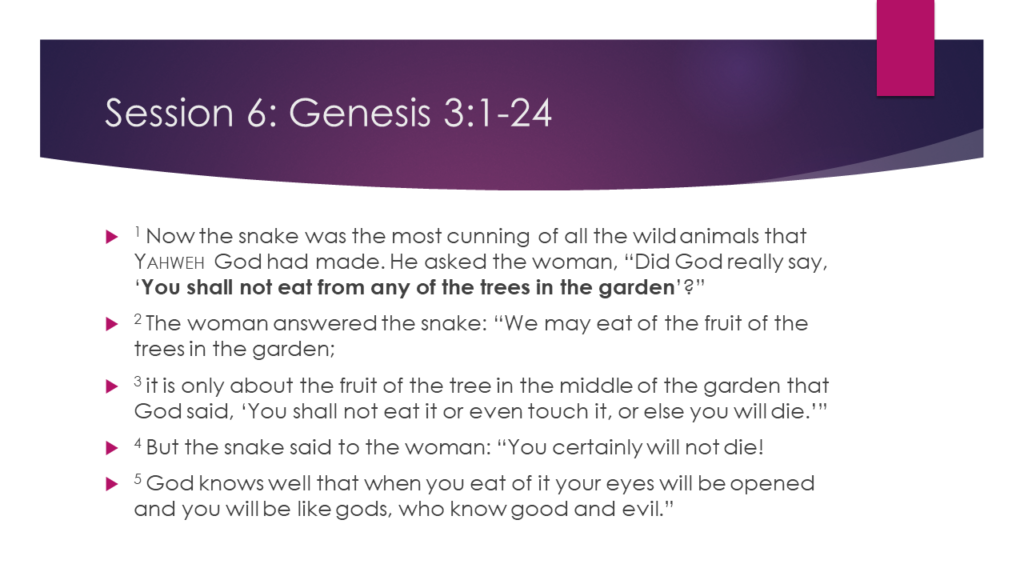
We’re about to see the astute insight the Yahwist author had into human nature. The serpent’s question, “Did God really say, ‘You shall not eat from any tree of the garden?” is cunning indeed. Isn’t it true that, whenever we’re forbidden to do something, that’s the only thing we want to do? There’s an old Ukrainian proverb that has a woman say to her son, “Johnny, don’t put peas in your nose.” Even if Johnny had no intention of ever putting peas in his nose, once he’s heard the prohibition, that’s the one thing he wants to do most. That’s one reason why prohibition of any kind will never work. So, the forbidden tree might as well be the only tree in the garden.
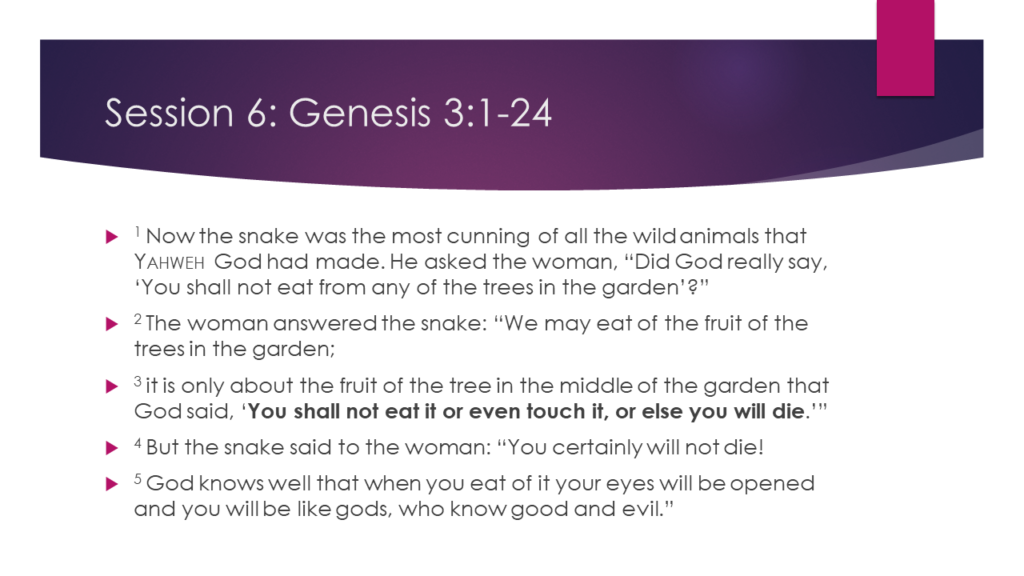
Please note what the woman replies. Was it noted anywhere that Yahweh God told the man and woman that they couldn’t touch the tree of knowledge of good and evil? In fact, nothing of the sort was said. But isn’t this human nature? If we’re afraid of something, don’t we put barriers up for ourselves so that we’re not as tempted? If we’re on a diet, don’t we put tempting snacks away someplace where it’ll be harder for us to get to them? Look at all the conservative religious groups that pile up heaps of rigid prohibitions to ensure that their members maintain their moral “purity.” Of course, just like in the current story, these things never work.
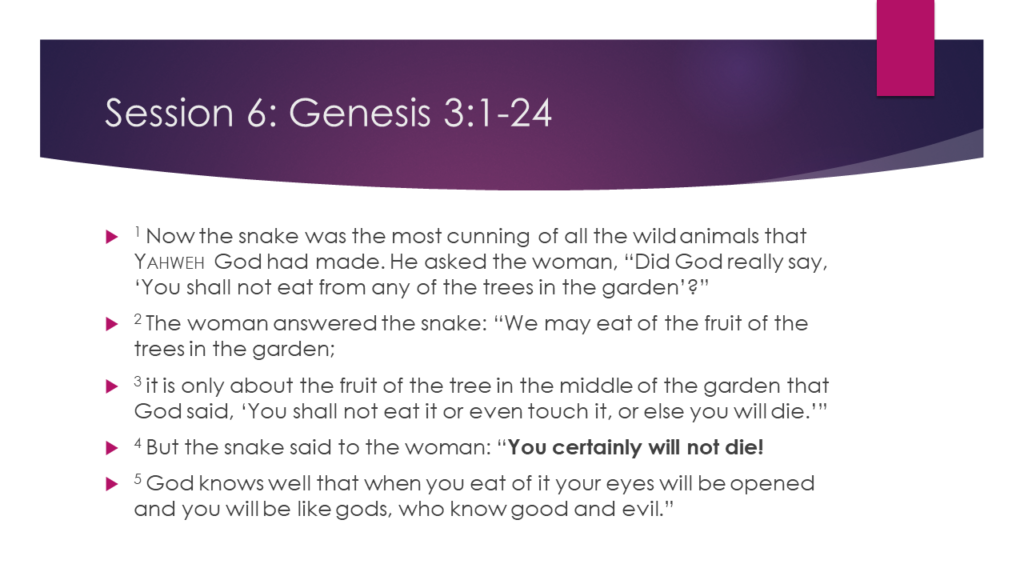
Just a brief comment on the serpent’s contradiction of what Yahweh God clearly said. It’s an instance of rationalization. Never mind the man and the woman. This is the sort of thing that goes on between our ears. When we’re given a set of instructions to get us from A to B, don’t we often say to ourselves, “I can’t imagine that I have to do all that?” Or, when we are given a caution that we need to avoid something, or there may be consequences, how often do we tell ourselves, “I can’t imagine it could be that bad?” In our own minds, we downplay the obstacles that stand in the way of our getting whatever it is we desire, or we overestimate our strength and intelligence, arrogantly believing that the rules don’t apply to us.
The serpent’s response is typical because it relies on half-truths. Aren’t bald-faced lies rather easy to see through? It’s a fact that half-truths seduce us into thinking, “Well, it seems reasonable; that might be true.” Here’s a case in point. The threat of death that Yahweh God levied on mankind was not a physical death. Genesis is not suggesting that humankind’s original condition was living forever. The death that the God of Genesis was talking about was a spiritual death, as we’ll see. So, the serpent’s retort is, in fact, a half-truth. When humanity exercises improper dominion and tries to play God, we do not immediately keel over dead. It takes a little longer.
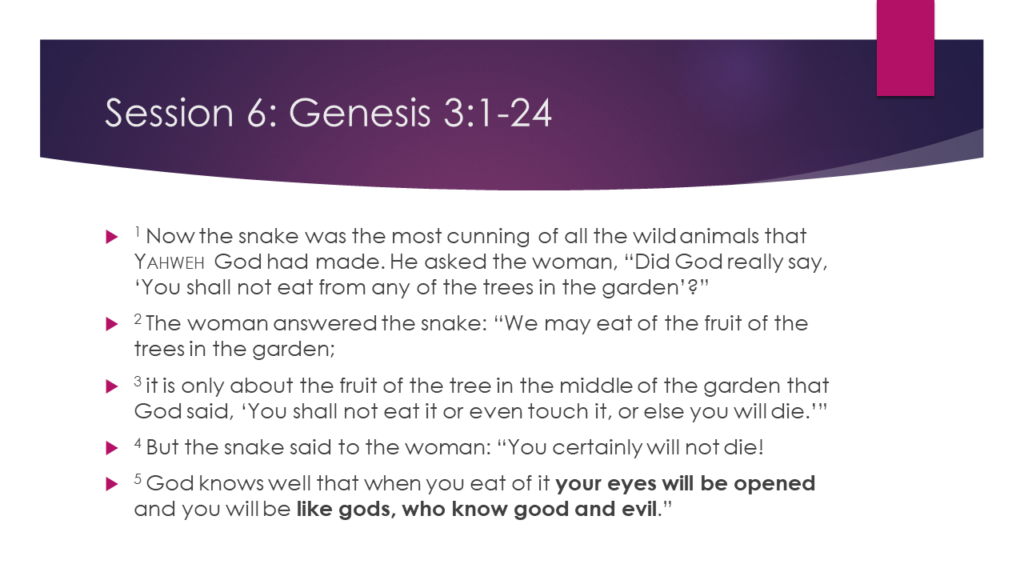
Here’s another of the half-truths that our temptations offer us. The text says, “…you will be like ’elohim…” Remember when we talked about ’elohim? It can mean three things. It can mean God himself. “You will be like God.” Or it can mean gods—as we see in our translation. That can be a problematic statement for monotheistic Israel. Or it can even mean the heavenly host, the divine counsel, the angels. It’s ambiguous to the hearer. But what do we do when we encounter an ambiguous situation? We interpret it always to our own advantage. We hear what we want to hear…and that’s what’s happening here. Do we have some dominion over ourselves and our world? Do we in fact exercise some power over everything? We’ve already said that we do. So, what’s the serpent suggesting? It suggests that our eyes are closed. It tells us we’re naive. We need to wake up and see things the way they really are. Then, we won’t have to rely on God anymore. We can believe in God, but we don’t really need God because, after all, “we’ve got this.”
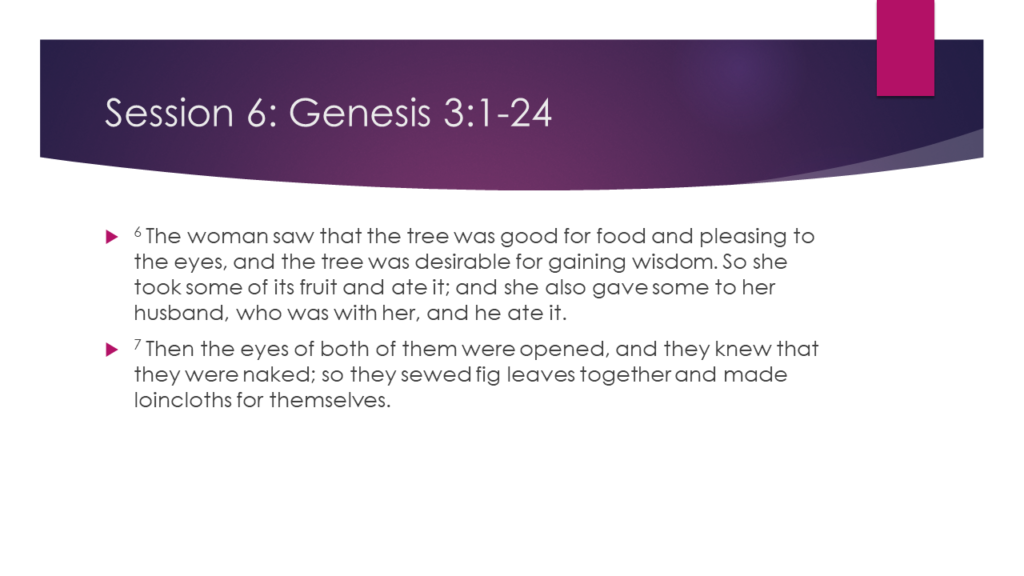
The purpose of God’s creation was to hold chaos at bay by bringing order to it. Humanity’s role in creation was to “till the soil,” in other words, to assist in the work of creating order. Now, humanity’s decision to go it alone, re-opens the door to chaos. The camel’s nose is in the tent. What the woman saw, and what we see, are all the positive features of our desires. This is the critical juncture for all moral decision-making. It’s the point where we minimize the consequences to obtain what we want. Our wants are not the same as our needs. God supplies our needs when we let him. It’s only when we allow our wants to masquerade as needs that we get into trouble. According to the way the woman saw it, the fruit of the tree of knowledge of good and evil is good for food—satisfying our hunger—and pleasing—attractive—and desirable. What is it that the Buddhists say? Desire lies at the root of suffering? They say that cravings for pleasure, material goods, and immortality can never be satisfied, and so we suffer. Here, her desire takes over,
And, what’s more, we’re examples to others. The woman gave some of the fruit of the tree to her husband. We see others doing what we want to do and gaining what we want to gain, and we’re seduced by their apparent success. We don’t stop to consider the price or the consequences. We only see there’s something we want, and we see someone else getting it. If they can do it, why shouldn’t we? So, he ate it.
Here’s a maxim that applies equally to the man and woman in the story and to us: you can do anything at all that you want to, so long as you’re willing to accept the consequences…and there are always consequences. So, the man and the woman ate of the tree of knowledge of good and evil, and what were the consequences? Their eyes were, indeed opened, but all they saw was their own nakedness. They experienced, to their shame, their ultimate powerlessness. That’s the wisdom that comes from playing God. That’s the understanding that we gain when we believe the rules don’t apply to us, and that, somehow, we’re the exceptions. Notice that it’s not God who punishes humanity. It’s a set of consequences that are built into the choices themselves. They apply to us as well as to the man and woman in the story when we’re unwilling to consider the inevitable consequences before making our choices.
The next passage we’re going to look at is fairly long, so bear with us.
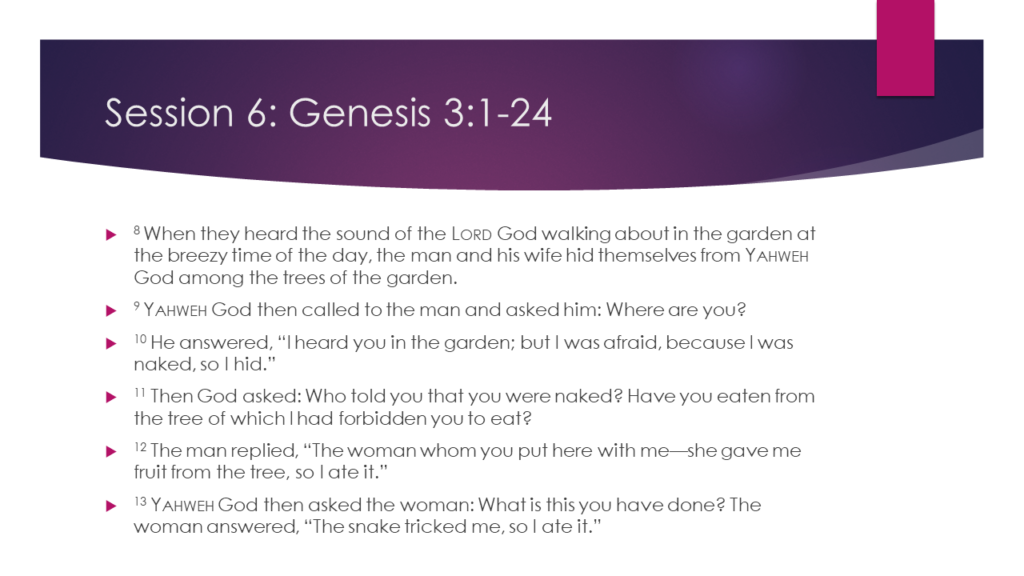
At this point, if you’ve had any doubts about how skillful the Yahwist was in pinning down human nature, this passage should clinch it. All the features of the Yahwist’s writing are on display here: not only does he use God’s proper name, but he also thoroughly anthropomorphizes God. We’re still in that sacred space called the garden, but it’s not exactly what we would consider a paradise. It’s pleasant. It’s a break from the unrelenting desert, and God’s out for an afternoon stroll in the cool of the day, shortly before sunset. He’s looking for his creation.
The man and the woman are more than guilt-ridden. They’re shame-based. The difference is that guilt says, “I did bad,” while shame says, “I am bad.” Guilt leads to acknowledgement, apology, and change of behavior. Shame leads to rationalization, excuses, and withdrawal. Their attempts to play God brought nothing more to the man and woman than the belief that they were inadequate, defective, and broken. But that isn’t the case. Shame never tells the truth. The man doesn’t acknowledge his wrongdoing, nor does he apologize. He simply confesses his fear. Fear of what? Fear of punishment. When we withdraw from fear of punishment, we’re reacting not to guilt but to shame.
God looks for an honest admission of guilt. It’s not complicated. “Have you eaten?” Yes, or no? The man does what we all do. He deflects. “It was the woman. She gave it to me. It’s her fault. I’m innocent. I’m a victim of her wiles. It’s not my fault.” The error is now compounded. Chaos is now pouring in. What he says next makes everything much worse. “It was the woman whom you put here with me. It’s your fault, God! You did this to me! I’m angry at you and I’m justified. See what you did?”
So, God, in exasperation, turns to the woman and asks her if that’s what really happened. Just like her husband, she deflects the blame. “I didn’t do anything wrong. It was the snake. He tricked me. I’m innocent.”
How human of them! They overstepped their limitations and were faced with the consequences. Their response was to refuse to take responsibility for their choices and their actions. I think that is the real sin of the man and the woman, the real sin of humanity: our original sin. It’s our failure to acknowledge our weakness and dependence on God, and accept responsibility for our actions. It’s the tragic flaw that opens all of creation to the influx of chaos.
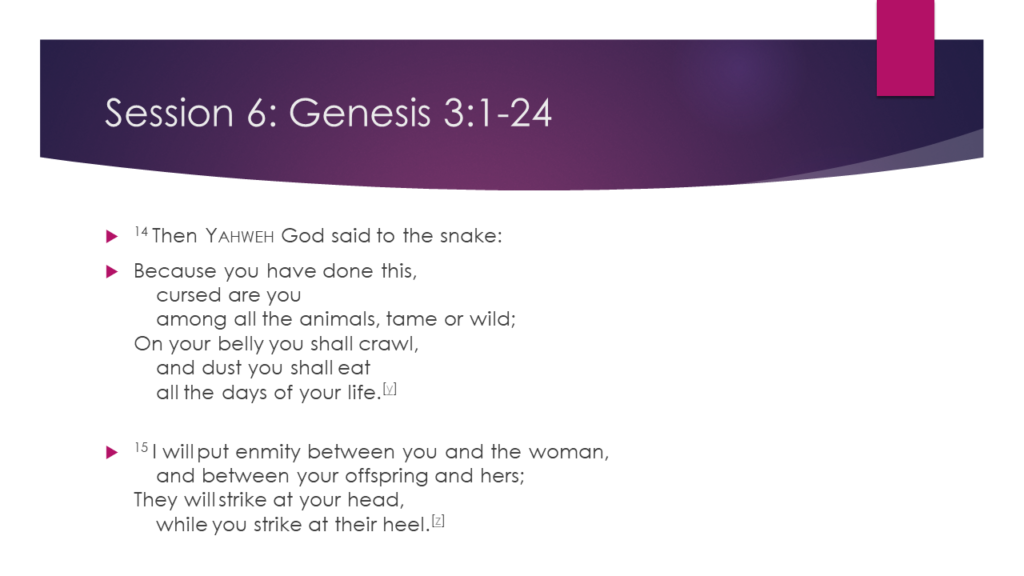
Here we have the first of the three punishments. Like all the Yahwist’s work, it isn’t concerned with what came before. It doesn’t care what the snake was like before now. It only serves to explain the current state of affairs. The curse of the serpent is a banishment. The snake has no interaction with any other creature. It’s a loner. It has nothing to hold it up out of the dirt, so the Yahwist imagines its state to be rather filthy and distasteful. He describes the current situation where most people are afraid of snakes and disgusted by them. He posits this as the result of the decree of an angry God. It’s an image of active hostility between humanity and the serpent world with no regard at all for the general harmlessness of the reptiles and their usefulness in our ecology. The interpretation of the woman overcoming the snake as a personification of Satan was a later Christian interpretation and can’t be justified by this text alone.
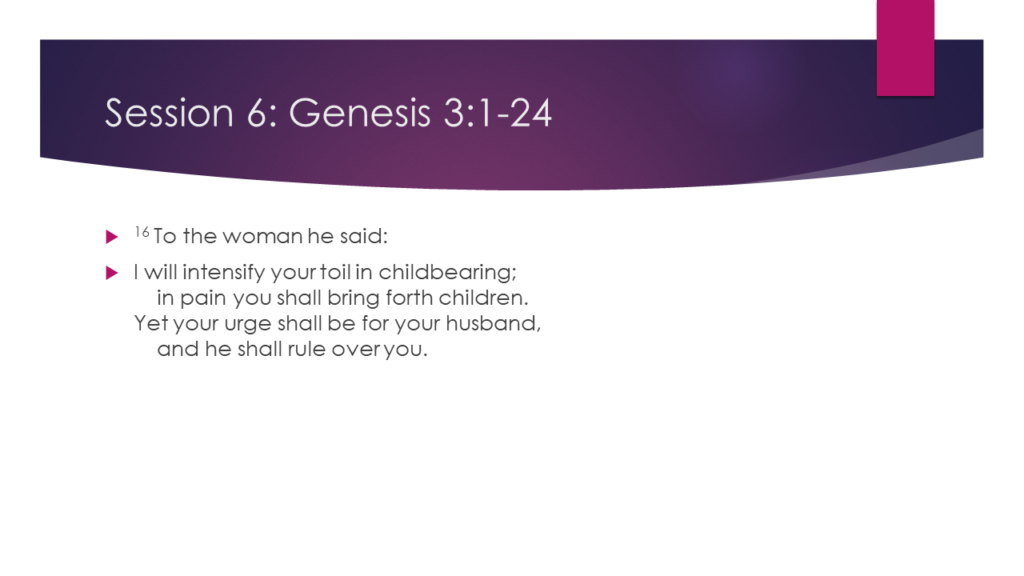
The consequences for the woman are not exactly a curse but serve to highlight the effects of this transgression on her social role as wife and mother. The paradox that this passage seeks to explain is why the blessing of children should be accompanied by excruciating pain. It was acknowledged that the pains of childbirth were of a severity that they could be used by the prophets to describe the agonies of a new creation. So, bearing children seemed to be a mixed blessing. Then, there was the other paradox: the woman’s “urge” for her husband. The “urge” in Hebrew is the urge to possess, the urge to unite, not just sexual yearning. It’s the urge to possess her man, but, in her culture, her man would actually possess her, like property. The Yahwist interpreted this as a disorder, and he ascribed it to this transgression which distorted everything.
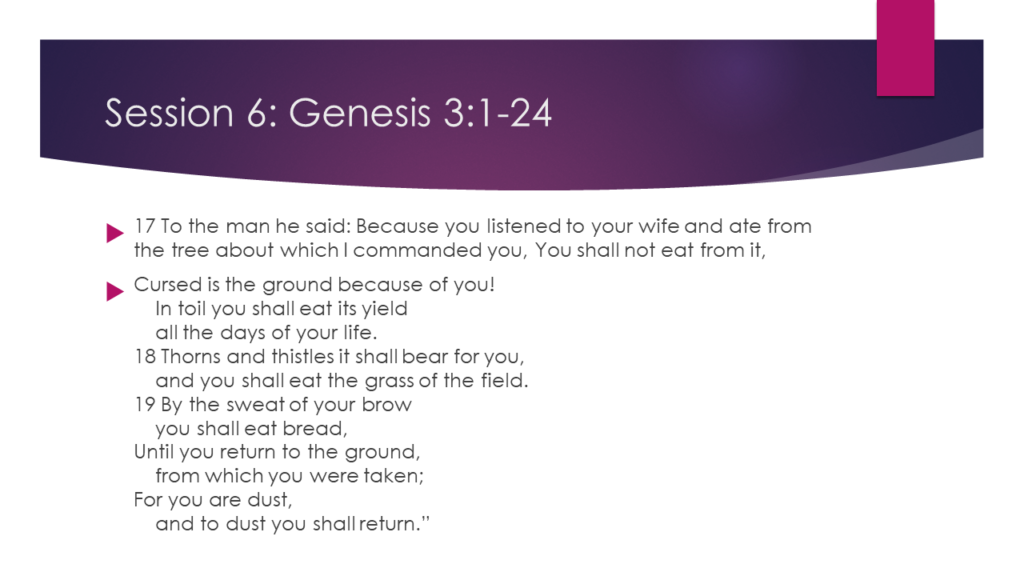
The paradox here is that humankind is taken from God’s rich creation—the earth—which has brought forth plants, trees, animals, and birds. But that same earth does not respond well to the work of the humans that were taken from it. Work was never meant to be a punishment. The human was created, after all, to cultivate creation. What needs an explanation is why, after so much work, humankind receives so few results. It’s not work that’s the punishment, it’s the futility. Don’t we all say, “Work is a four-letter word?” The Yahwist needed to provide an explanation for why this is so. Finally, the last sentence is not meant to imply that death was a punishment. It’s simply a poetic way of saying, “All your life.” Futility will dog you until you rest in the ground. This comes full-circle now, as the promise of the temptation was that the knowledge that was supposed to make humankind like the gods simply revealed to us our hapless mortality.
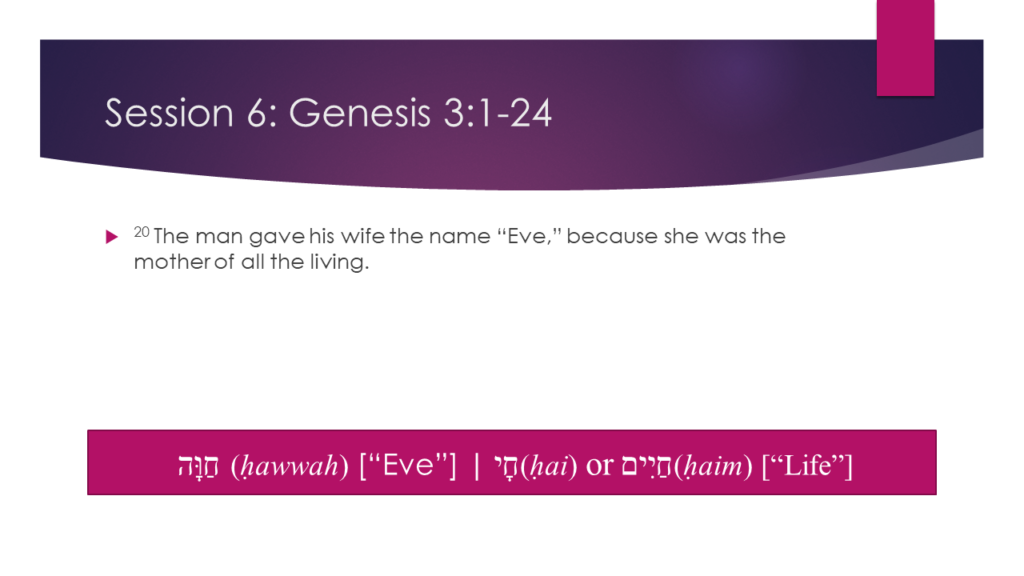
This one little verse is fairly interesting. “Wife” and “woman” are the same word in Hebrew. Of course, the woman אשׁה (’ishah) has already been named as one who has been taken from the man אשׁ (’ish). But now, the man gives the woman an even more proper name. Her name in Hebrew is חַוָּה (ḥawwah) which is related to the word for “life” חָי (ḥai) or חַיִים (ḥaim). So, in effect, the two people are Mr. Human and Mrs. Living. What’s interesting is that his naming her happens right after the woman is told that she would be subject to the man. As in every case, this doesn’t mean that the Yahwist is suggesting that this is the way things should be (in fact, the opposite is true), but this is just the way things were at the time he was writing.
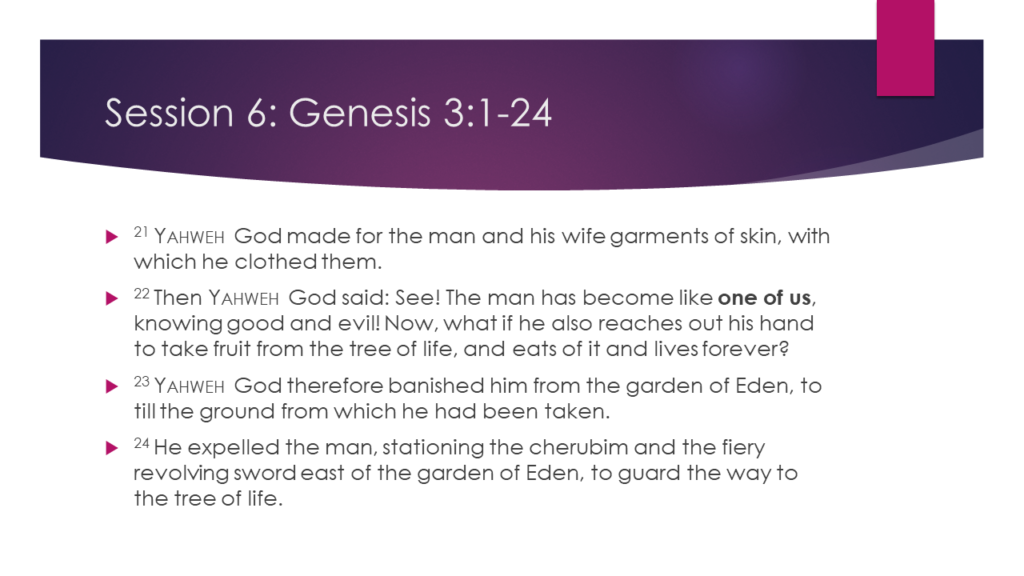
We have come to the last four verses of our subject, and the end of the Yahwist’s creation story. Chaos has been pushed back by God’s creative work, but it’s returned in a different form through humankind’s arrogance. The pain that man and woman must endure in this life has been explained. Now, it’s time to wrap it up.
First, what’s with the leather garments? Scripture scholars are scratching their heads, too. We’ve already seen that the man and woman sewed fig leaves together to make loincloths. There are a couple of reasons for this repetition. One may be that the Yahwist wanted to show that, even after punishing them, God still cared for them. Another reason might be that the garments were of skins, or leather. Up until now, animals were to be helpmates for humans. Does this mean, that the prohibition against shedding the blood of living things has been lifted? If so, that’s yet another encroachment of chaos.
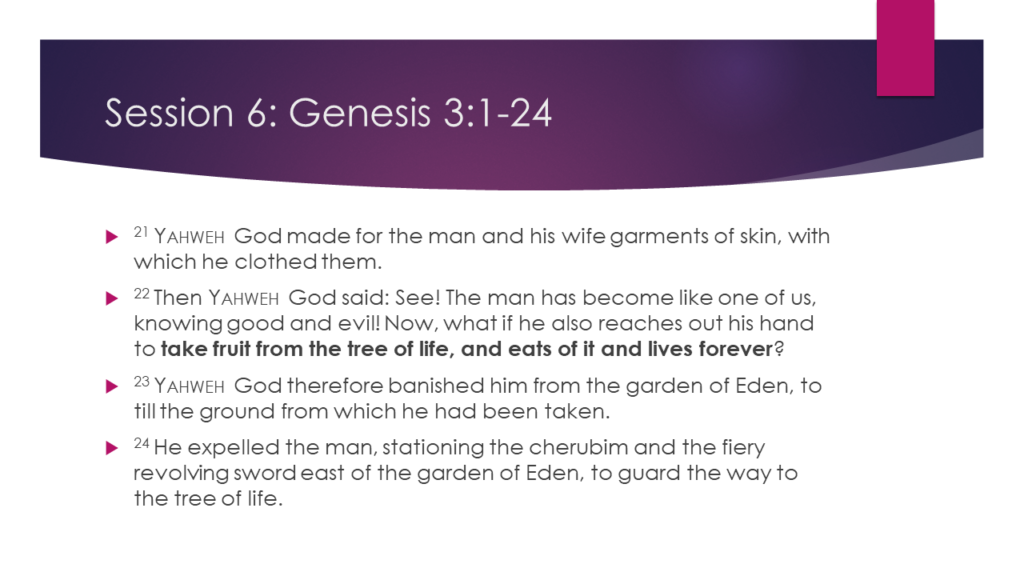
Verse 22 is probably an instance of the Yahwist taking an older myth into his writings verbatim. There’s no getting around the “us” in this passage. That may be one reason why this whole section seems out of place. Remember that in the last session, I mentioned that scholars believe that the Yahwist’s story was a combination of two older stories: one was the story of creation with plants, animals, and humans where the tree of the knowledge of good and evil grew; the other was the story of a garden in Eden where there was the tree of life? Here, the second story is returning, and we need to talk about this tree of life.
Ancient myths were not kind to humanity. For their gods, humans were play toys to be manipulated and useful only for their labor and their worship. We were sort of unwanted stepchildren of their gods. Meanwhile, humanity was striving for immortality, which the gods viewed as a threat, and did everything in their power to keep humans from gaining the gift of immortality. Toward the end of the Epic of Gilgamesh, on Tablet XI, there’s a story that illustrates the ancient attitude toward human immortality.
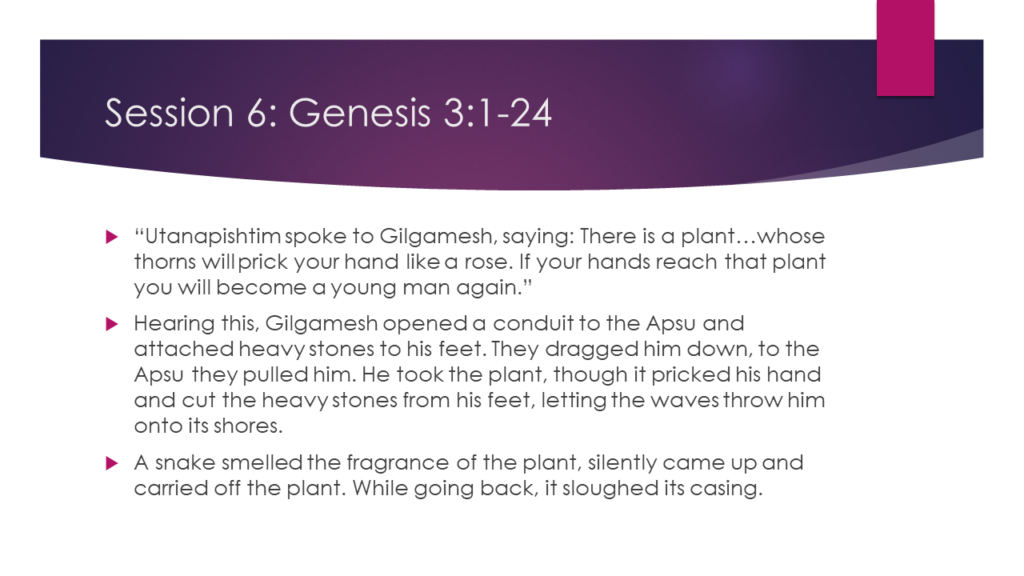
A magical plant at the bottom of the ocean is not exactly the same as a tree of life, but the idea is the same. Gilgamesh had this plant of eternal youth but lost it to a snake. The choice of the snake was not arbitrary, because one of the other mythological beliefs about snakes was that, as they sloughed off their skin, they were eternally renewed. So, in this story, the snake received the eternal youth that Gilgamesh sought. In this story, as in Genesis, the snake spoiled humanity’s chances for immortality. There’s a link to the Epic of Gilgamesh in the transcript of this session [click here].
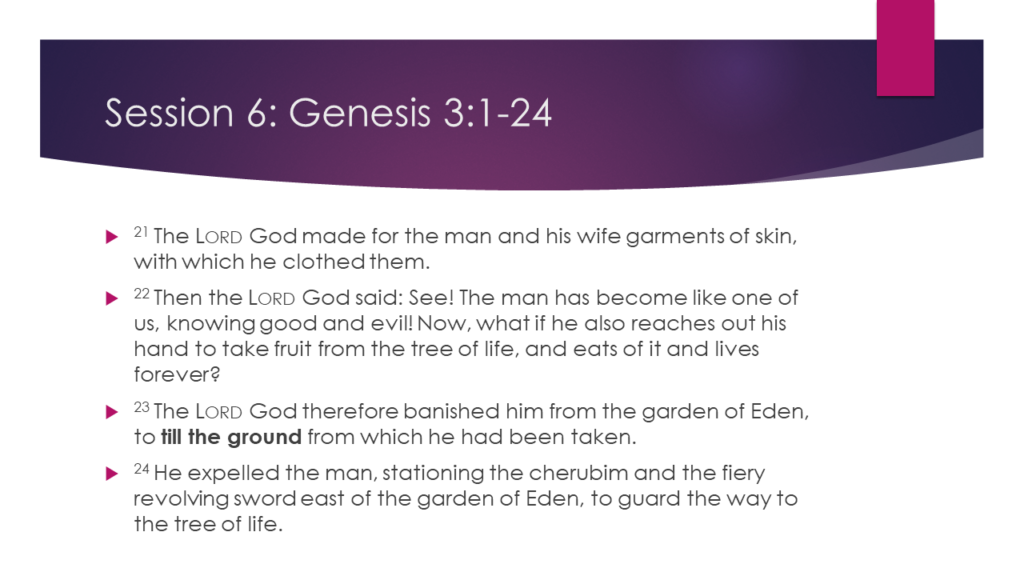
As I mentioned before, we must not imagine that immortality was the original condition of humanity and that we lost it through sin. In the Eden part of the story, the human didn’t actually belong in the garden to begin with. The banishment from the garden wasn’t really a punishment, because, after all, the reason the human was created was “to till the soil” and to cultivate the land. Earthly immortality is not an option for humanity. The Yahwist is only describing what is.
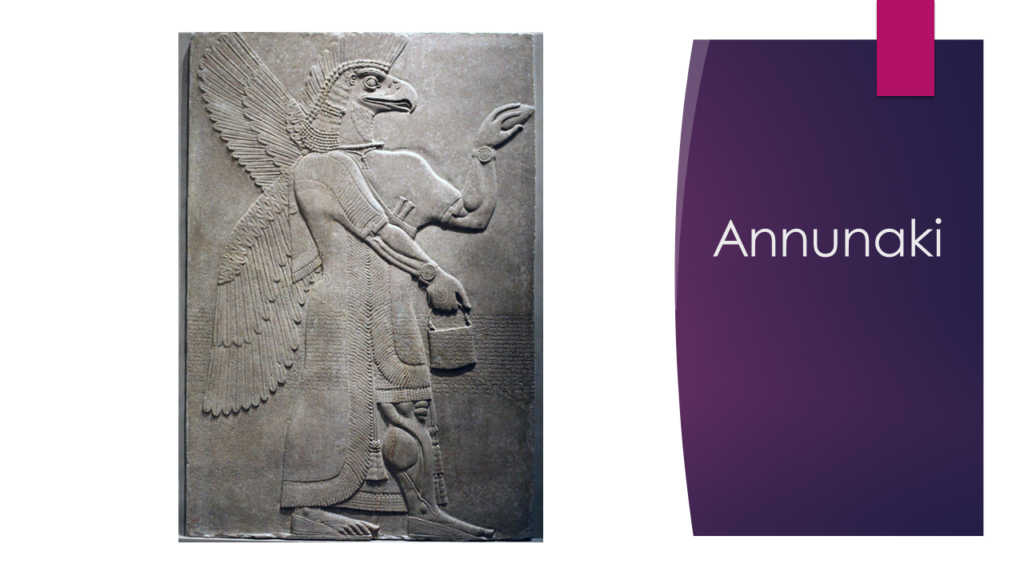
In the last verse, God stations cherubim to the east of the garden, blocking humanity’s entrance. Cherubim must not be confused with cherubs. Cherubim were fierce griffin-like monsters with six wings similar to the Akkadian-Babylonian Anunnaki gods. Pairs of statues of them were positioned at the doors to temples to act as guardians and a pair was even stationed on the Mercy Seat which was the cover of the Ark of the Covenant and the throne of God in the Jerusalem temple. The message was clear that earthly immortality would be forever off-limits for humankind.
Conclusion:
“Thus endeth the lesson,” as they say. There are a number of important points that I’d like to leave you with, after this extensive foray through the first three chapters of the Book of Genesis.
- The first point is that, when studying texts that are two or three thousand years old, there are no easy answers. There’s an amazing amount of richness in our Judeo-Christian Scriptures, but it takes work to get ourselves back into the minds of the authors.
- Next, it’s important to remember that God didn’t hand down our Scriptures ready-made, nor were they written in a vacuum. They’re the product of cultures with unique histories, languages, vocabularies, thought processes, and goals far different from our own.
- The authors of Genesis had no concept of what we call “history.” They wanted to share their understanding of things, and that understanding did not depend on what “really happened.” They didn’t care about such things.
- They wanted people to come away from their writings with a deeper appreciation of the gift of creation and the power of the God who formed it. They also wanted people to better understand humanity’s place within it.
- Finally, I want you to come away with a deeper sense of the sacred. It’s too easy to get caught up in the physical world and miss that there’s an entirely other dimension, equally real, where things like home, sanctuary, prayer, heroes, and even relics exist. Without that, our connection to the Scriptures, our connection to God, and our connection to one another cannot exist.
